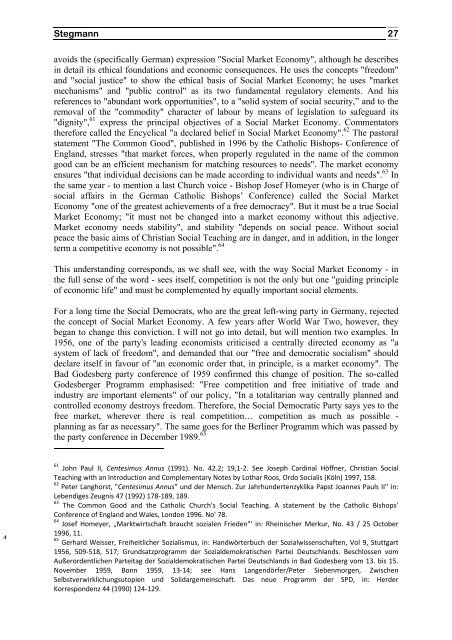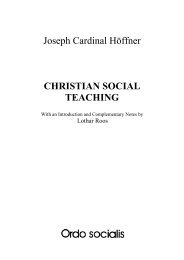Prof. Franz Josef Stegmann Bethlehem Social ... - Ordo Socialis
Prof. Franz Josef Stegmann Bethlehem Social ... - Ordo Socialis
Prof. Franz Josef Stegmann Bethlehem Social ... - Ordo Socialis
Create successful ePaper yourself
Turn your PDF publications into a flip-book with our unique Google optimized e-Paper software.
<strong>Stegmann</strong><br />
avoids the (specifically German) expression "<strong>Social</strong> Market Economy", although he describes<br />
in detail its ethical foundations and economic consequences. He uses the concepts "freedom"<br />
and "social justice" to show the ethical basis of <strong>Social</strong> Market Economy; he uses "market<br />
mechanisms" and "public control" as its two fundamental regulatory elements. And his<br />
references to "abundant work opportunities", to a "solid system of social security,” and to the<br />
removal of the "commodity" character of labour by means of legislation to safeguard its<br />
"dignity", 61 express the principal objectives of a <strong>Social</strong> Market Economy. Commentators<br />
therefore called the Encyclical "a declared belief in <strong>Social</strong> Market Economy". 62 The pastoral<br />
statement "The Common Good", published in 1996 by the Catholic Bishops- Conference of<br />
England, stresses "that market forces, when properly regulated in the name of the common<br />
good can be an efficient mechanism for matching resources to needs". The market economy<br />
ensures "that individual decisions can be made according to individual wants and needs". 63 In<br />
the same year - to mention a last Church voice - Bishop <strong>Josef</strong> Homeyer (who is in Charge of<br />
social affairs in the German Catholic Bishops’ Conference) called the <strong>Social</strong> Market<br />
Economy "one of the greatest achievements of a free democracy". But it must be a true <strong>Social</strong><br />
Market Economy; "it must not be changed into a market economy without this adjective.<br />
Market economy needs stability", and stability "depends on social peace. Without social<br />
peace the basic aims of Christian <strong>Social</strong> Teaching are in danger, and in addition, in the longer<br />
term a competitive economy is not possible". 64<br />
This understanding corresponds, as we shall see, with the way <strong>Social</strong> Market Economy - in<br />
the full sense of the word - sees itself, competition is not the only but one "guiding principle<br />
of economic life" and must be complemented by equally important social elements.<br />
For a long time the <strong>Social</strong> Democrats, who are the great left-wing party in Germany, rejected<br />
the concept of <strong>Social</strong> Market Economy. A few years after World War Two, however, they<br />
began to change this conviction. I will not go into detail, but will mention two examples. In<br />
1956, one of the party's leading economists criticised a centrally directed economy as "a<br />
system of lack of freedom", and demanded that our "free and democratic socialism" should<br />
declare itself in favour of "an economic order that, in principle, is a market economy". The<br />
Bad Godesberg party conference of 1959 confirmed this change of position. The so-called<br />
Godesberger Programm emphasised: "Free competition and free initiative of trade and<br />
industry are important elements" of our policy, "In a totalitarian way centrally planned and<br />
controlled economy destroys freedom. Therefore, the <strong>Social</strong> Democratic Party says yes to the<br />
free market, wherever there is real competition… competition as much as possible -<br />
planning as far as necessary". The same goes for the Berliner Programm which was passed by<br />
the party conference in December 1989. 65<br />
61 John Paul II, Centesimus Annus (1991). No. 42.2; 19,1‐2. See Joseph Cardinal Höffner, Christian <strong>Social</strong><br />
Teaching with an Introduction and Complementary Notes by Lothar Roos, <strong>Ordo</strong> <strong>Social</strong>is (Köln) 1997, 158.<br />
62 Peter Langhorst, "Centesimus Annus" und der Mensch. Zur Jahrhundertenzyklika Papst Joannes Pauls II'' in:<br />
Lebendiges Zeugnis 47 (1992) 178‐189, 189.<br />
63 The Common Good and the Catholic Church's <strong>Social</strong> Teaching. A statement by the Catholic Bishops’<br />
Conference of England and Wales, London 1996. No' 78.<br />
64 <strong>Josef</strong> Homeyer, „Marktwirtschaft braucht sozialen Frieden"' in: Rheinischer Merkur, No. 43 / 25 October<br />
1996, 11.<br />
4 65 Gerhard Weisser, Freiheitlicher Sozialismus, in: Handwörterbuch der Sozialwissenschaften, Vol 9, Stuttgart<br />
1956, 509‐518, 517; Grundsatzprogramm der Sozialdemokratischen Partei Deutschlands. Beschlossen vom<br />
Außerordentlichen Parteitag der Sozialdemokratischen Partei Deutschlands in Bad Godesberg vom 13. bis 15.<br />
November 1959, Bonn 1959, 13‐14; see Hans Langendörfer/Peter Siebenmorgen, Zwischen<br />
Selbstverwirklichungsutopien und Solidargemeinschaft. Das neue Programm der SPD, in: Herder<br />
Korrespondenz 44 (1990) 124‐129.<br />
27















